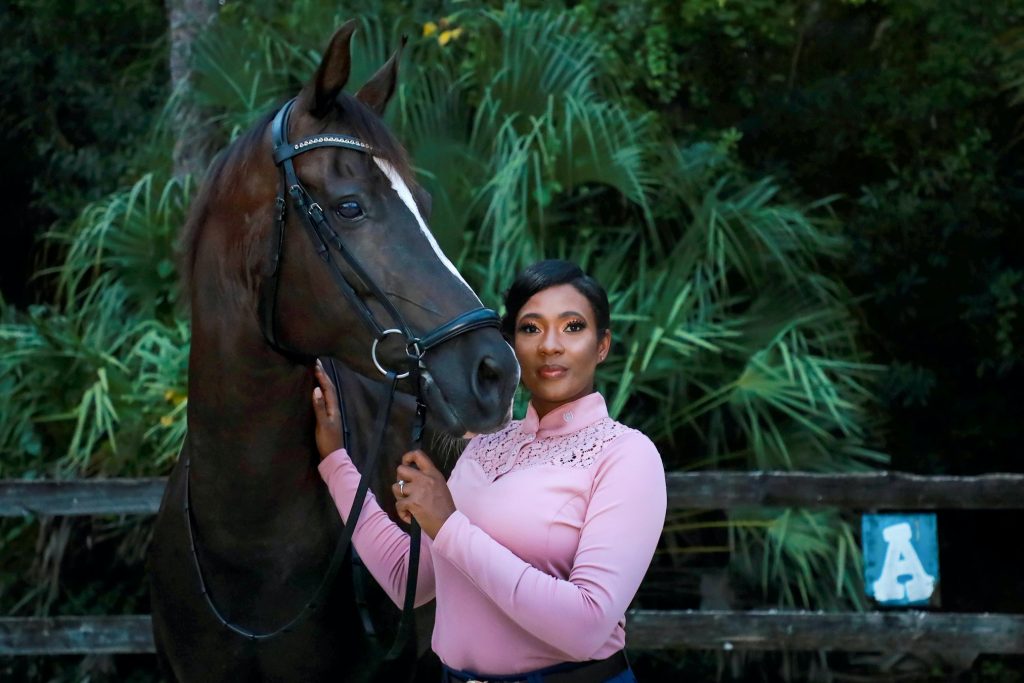
In the elite, predominantly white world of horseback riding, Black women face a painful set of challenges.
Philesha Chandler-Celeste Sloman
In an upcoming issue of ELLE Magazine for October 6th, they examine the equestrian world and how it doesn’t make room for black riders. Elle Magazine was gracious enough to reach out to Past The Wire and ask us to share excerpts of this article. This article in part shares past experiences from black riders and the United States Equestrian Federation weighs in on what it is doing to make the sport more inclusive. The original article can be found here.
When people talk about the equestrian world in America, they’re usually referring to the one governed by the United States Equestrian Federation (USEF) and tied to major national competitions—and Olympic dreams. The costs to get into the sport (and advance to higher levels), however, are steep, when it comes to both money and time.
Finances aside, once you’ve ventured into the sport, it’s a whole other hurdle for Black people, especially women. Black riders make up less than 1 percent of the USEF, and a Black equestrian has never competed for the U.S. in the Olympics.
Philesha Chandler, a Black dressage competitor from Florida, learned the hard way how alone Black people can feel in the sport. When she was a working student at a Kansas riding-lesson and boarding stable, she wasn’t treated like her white fellow riders, and they never stood up for her. White students at the barn were assigned the typical duties associated with a horse barn: tacking, cleaning stalls, feeding and grooming horses, painting fences. Her trainer would ask Chandler to clean her house: sweep and mop the floors, clean the bathrooms, and wash the dishes.
“It was one of those ‘What?’ moments,” Chandler says. “For the trainer to feel I was the best choice for her house chores because of the color of my skin—I was hurt.” Still, she never spoke up, for fear of losing access to the barn and its horses. “There are so many times I experienced racial prejudice in this sport,” she says, that she eventually grew numb. Now a dressage trainer with her own business, she prioritizes mentoring Black kids interested in dressage. “I want them to know that we belong here, and they can do this.”
Scnobia Stewart, a jumper from North Carolina, experienced something similar when she participated in a two-day clinic with Olympian Lendon Gray at a private stable in North Carolina. The 26-year-old worked hard at her Orange County Animal Services day job to save around $800 to travel to the clinic and stable her Dutch Harness horse, Zima. One morning as she braided Zima’s mane, a middle-aged white woman (who Stewart says didn’t work there or attend the clinic) walked up to her and asked if she was there to braid all the horses’ manes. “She looked at me [like I’m] ‘the help,’ ” Stewart says. “It wasn’t the first time [this] had happened to me, and I didn’t want to cause a scene. I let her know that the horse was mine and I was one of the riders in the clinic.” The woman looked at her in disbelief. After sizing up Stewart a moment longer, she walked away.
Veteran show jumper Donna M. Cheek remembers coming up in the ‘70s, and microaggression that were no so micro. “People didn’t want to recognize me because of my skin color,” she remembers. Competing as a hunter–scored at the judge’s discretion–Cheek would get very low marks compared to her white counterparts. “After races people would tell me, ‘That wasn’t right’”
“People need to be exposed to stories like mine,” says top rider Jordan Allen. “That you can do this and not have all the money.” Allen started riding when she was 7; by 10, her talent caught the eye of well-known trainer Kim Carey. She recommended Allen for the prestigious training center Ashland Farms, where she became a working student. “[Riding at Ashland] exposed me to other barns and to other people giving me horses,” she adds. Without mentorship, scholarship, and access, getting to the top may not have been possible. Allen counts herself lucky: She won the Overall Grand Champion title (in the 3’6″ section) at the USEF Junior Hunter National Championship. But the 19-year-old is usually one of the few Black riders at horse shows and is the only Black athlete on her University of South Carolina equestrian team. Young Black girls reach out to her on Instagram to tell her she’s an inspiration. It’s important for them, she says, to “see me out there.”
USEF says it’s doing the work needed to make the sport inclusive and fair. “The experiences recently shared with us by Black members of our community are heartbreaking and deeply troubling,” said CEO Bill Moroney in a statement to ELLE. “They were also a wake-up call, and we now see US Equestrian has not been a strong enough ally for Black equestrians—especially Black women.” The federation is pledging to provide a special performance-based grant for riders; enact financial support programs that give access and promote education within the industry; implement mandatory antiracist and unconscious bias training for USEF’s staffers and board; and include more Black women in marketing materials. “It’s important that people see themselves,” says Vicki Lowell, USEF’s chief marketing and content officer.

“I’m happy that USEF is paying attention and trying to make changes,” Shaquilla “Shaq” Blake, a rising Black equestrian, says. “I hope it’s lasting change and not just something for the moment.” Meanwhile, she’s raising awareness about the lack of diversity on her blog, theblackequestrian. “It’s going to take all of us staying strong and fighting for the sport we love,” she says.
Courtesy of ELLE Magazine



